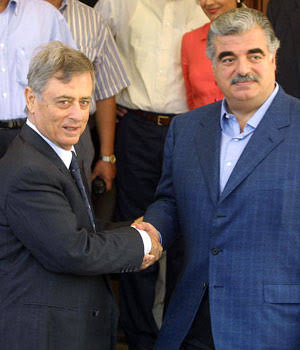In the absence of Abdul-Halim Khaddam, the curtain falls on the last witnesses of a phase in Syria’s history and the Lebanese-Syrian relationship. This follows his isolation in Paris after defecting from Bashar al-Assad’s regime following the assassination of the late President Rafik Hariri in 2005. Khaddam was a symbol of Syrian political dominance over Lebanon during the era of the late Hafez al-Assad. He was known for overseeing the “Lebanon file” in the Syrian leadership alongside the former Chief of Staff, the late General Hikmat al-Shihabi, who had influence over Assad Sr. Additionally, there was the “Lebanese governor,” the late General Ghazi Kanaan, whom Damascus claimed committed suicide on October 12, 2005, in his office at the Ministry of Interior, three weeks after being interrogated by the International Investigation Commission on Hariri’s assassination. Another account suggests he was killed for providing information about the operation.
The Hariri assassination was the reason for Khaddam’s departure from Syria, as his disagreements with Bashar al-Assad escalated. These disagreements began when the latter assumed power after his father’s death in 2000, despite Khaddam, as Vice President under Hafez al-Assad, playing a role in facilitating the transition of presidential power to Bashar. The succession was predetermined, as Bashar had been groomed for the position after the death of his brother Basil. This was achieved by entrusting his training to several Alawite officers in the intelligence apparatus, highly loyal to the Assad family.
In the absence of Abdul-Halim Khaddam, along with Hikmat al-Shihabi and Mustafa Tlass, the Minister of Defense (who left Syria after the outbreak of the revolution in March 2011), the Sunni nucleus of the Ba’athist regime, was later dismissed. However, “Abu Jamal” represented, for three decades, as the Minister of Foreign Affairs and then Vice President, the Arab face of the regime in conferences and channels of communication with Arab countries. He was one of the elements that maintained the balance in Syrian-Arab relations, which collapsed when Bashar shifted completely towards prioritizing the relationship with Iran. In Lebanon, Khaddam became known as the spiritual father of the tripartite agreement to end the Lebanese civil war between leaders Nabih Berri, Walid Jumblatt, and the late Elie Hobeika, a agreement later dismantled by Samir Geagea. He also participated in tilting the balance towards the Taif Agreement in 1989. He assumed the role of the regulator of internal Lebanese politics during internal conflicts and, with his friend Rafik Hariri assuming the premiership, called for him to “dream” of rebuilding the country. Despite dealing abruptly with Lebanese politicians, he distinguished between the coercive security behavior of intelligence officers and political dealings, understanding the sensitivities and balances of Lebanese politics. He defended his friends, Berri and Jumblatt, against what was called the Alawite cell within the regime. Despite being sidelined from the Lebanon file, he tried to convince Bashar to consider options other than extending President Emile Lahoud’s term, realizing the depth of internal opposition to him.
Khaddam did not hesitate to confess to international investigators about Hariri’s assassination, stating that the operation would not have taken place without the knowledge and approval of the Syrian president. Khaddam knew how much Bashar hated Hariri, surrounding himself with opponents of both Syrians and Lebanese before assuming the presidency. In the last few months, Khaddam advised Hariri to leave Lebanon.
With the outbreak of the revolution he anticipated from Paris, he repeated several times, like General Shihabi, that Bashar would lead Syria to partition.

